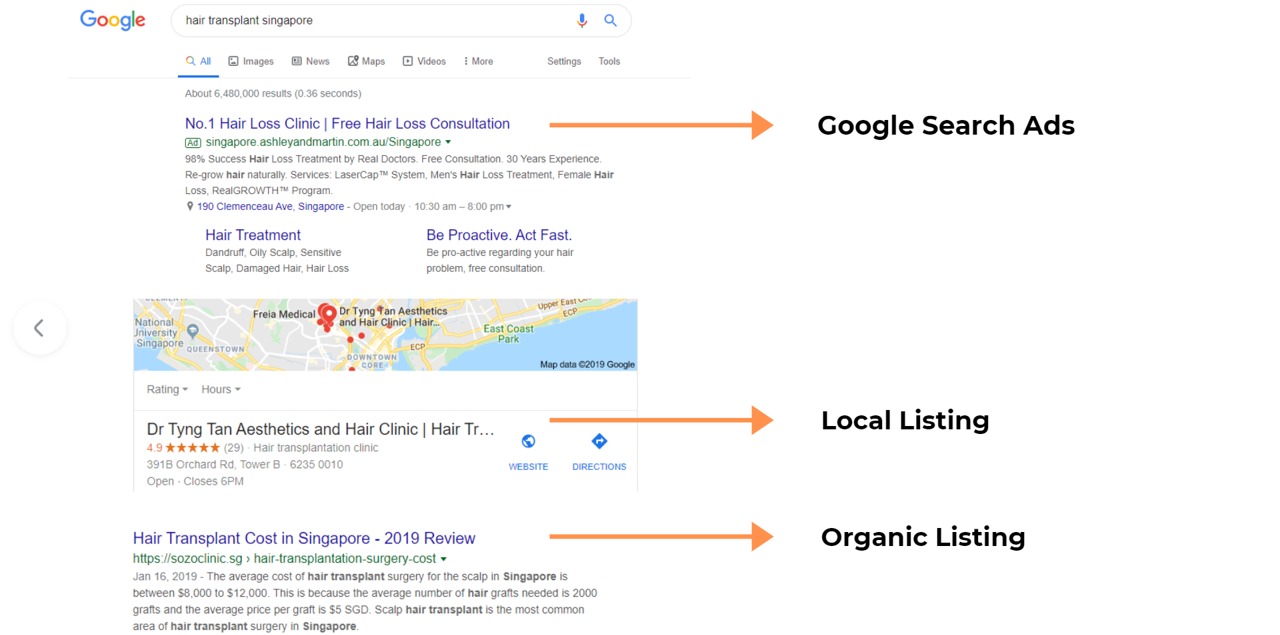SEO VS PPC: WHAT’S BEST FOR MY BUSINESS?

By now, every businessman's bound to have heard the terms “SEO” and “PPC” at least once in the span of his career, and has asked himself how these can boost their business growth.
Before going in depth and comparing the two, allow us to begin by pointing out that there are really only two ways for your business to dominate your industry on search engines: SEO, or Search Engine Optimisation, and Paid Search. Whether it’s Google, Bing, Yahoo, Baidu, Naver or any other search engine, they all operate on the same principles.

Don’t panic, it’s Organic
SEO is a way to increase traffic to your website by organically achieving high rankings in natural search results. Obviously, for SEO, how a website ranks depends on a particular search engine’s algorithm, and obviously, the most sophisticated algorithm by far belongs to Google with its undisputed market share.
- Google: 92.95%
- Bing: 2.32%
- Yahoo: 1.6%
- Baidu: 0.83%
- Yandex RU: 0.55%
- Yandex: 0.55%
Source: Statcounter GlobalStats
SEO efforts include improving your page content, titles, backlinks, meta descriptions and other copy-related improvements.
It’s vital to do some research to be able to apply the best search engine optimisation techniques to the online handles of your business. If successfully done, your site will be much more likely to be displayed on the top results pages more often. It might take some time to improve your content naturally, but rest assured that once you get there, the time and effort will be well worth it.
Businesses are strongly encouraged to include SEO in their long-term marketing strategies. Establishing your presence organically with SEO through website and content optimisation to rank higher in search results pages can say a lot about your brand.
Gaining organic search visitors for your website directly informs your target market that you are a top service provider who’s credible and an important player in your industry. This will result in consumers trusting your brand, services, and products even more.
Look before you leap
Even with all the benefits of SEO, bear in mind that SEO algorithms change from time to time. This means that businesses can drop in their search rankings overnight especially if they're in a super competitive market. Paid Search, on the other hand, assures you of a stream of daily visitors.
This one of the reasons why it takes time to build page authority using SEO, since you can never really tell when the next algorithm update will be or what your competitors are going to do to rank, next.
And while organic traffic is often touted as a “free” way to rank, the reality is that it isn’t. Creating good content and making sure that the likes of Google and Bing can find it (through on-page and technical SEO optimisation) takes money as well as time. So with all the expensive SEO service providers out there, you could actually spend a lot on optimisation.
You get what you Paid for
On the other end of the spectrum across from SEO, which is organic search performance, you have Paid Search. So what you can’t achieve through organic means, which takes a longer time and a lot more iteration, you can achieve faster through your paid search.
Basically, paid search is all about you buying space on search engine results pages according to the queries, or the words people use when they’re searching for something. And the pricing model behind paid search is what is known as PPC.
PPC is the way advertising platforms (in this case, the search engines) charge for the space you buy.
If you want to know how PPC is calculated, we’ll have to get a little technical: PPC was derived from CPM or Cost Per Mille. “Mille” is Latin for “thousands”, so CPM is way for advertising platforms to charge for every 1,000 impressions of an ad on a certain webpage.
Another factor that goes into calculating PPC is eCPM, where the “e” stands for the “earnings” per thousand impressions that the advertising platform wants to make off of advertisers. Other factors include the search engine’s algorithm, supply and demand, and the cost of running a business.
The Case for Paid
Paid Search using PPC ads give your website top placement in the sponsored results section of each search engine’s results pages, depending on your chosen keyword and how competitive this keyword is in the current market.
But that's not all: You can also advertise your website on other sites that have a significant amount of traffic that matches your target user demographics. This means that your ads will be seen by your targeted users every now and then to establish brand recall among potential customers.
That makes using Paid Search a great way to launch your business’ digital marketing efforts by bringing in immediate traffic, especially if your business is an emerging one. Despite your business’ being a new one, it is still helpful to start with small campaigns that are highly targeted to reach your audience, as this can lead to significant returns on your initial investment.
But what makes Paid Search really great is the fact that you don’t have to wait for months to get your website ranked. You can go straight to testing your copy, landing pages, and whether your website is resonating with your audience and your targeting.
More importantly, you can go straight to buying into the keyword queries that people use when looking for the solutions you offer, to coincide with their buyer’s journey.
You see, the quality of the leads you get from paid search on Google would be higher than those who are just starting to search for the kind of solutions your business offers.
These leads would be at the consideration stage of their buyer’s journey (where they’re comparing your solution with your competitors’) or the decision stage (when they’re on the verge of choosing and paying you for your solution). Such leads search mostly for brands, reviews, comparisons or store locations.
Before you start paying…
Take note that one aspect to consider when using Paid Search is your overall industry range and how much your competitors are paying for ads. Average CPCs (cost per click) can range from about US$2 to a costly US$30, depending on the main keywords or phrase you want to associate with your business.
To check this, you can use a traffic estimator within the free Google external keyword research tool, which will tell you estimated competition levels as well as the number of advertisers bidding on your chosen keyword. If you’re just starting out with your business, you should know CPCs make it substantially more difficult for businessmen to get profit from PPC traffic.
So should you go SEO or choose Paid Search?
Although both SEO and Paid Search are used to boost traffic to a certain website, the biggest difference is that with Paid Search, you pay for traffic using advertising platforms such as Google Ads or Bing Ads.
If you’re having a hard time choosing between the two digital marketing channels in terms of which benefits your business more, the first step is to analyse your business goals, needs, and budget.
Deciding between these two strategies depends on what you want to accomplish for your business, whether it’s in relation to selling a new product or service, penetrating a large industry, or simply raising awareness for your branding and building brand loyalty among consumers.
The choice between prioritising Paid Search or SEO for your digital marketing will also be influenced by how much you’re willing to spend for traffic, and how fast you want traffic to go to your website.
When using PPC ads, take note that it’s good to start with a minimum of $5 to $10 per day. When using SEO, remember that it’s crucial to monitor content quality and management.
Not “or”, but “and”
Having come to the “final round” of the SEO vs Paid Search bout, it’s time to announce the winner: It’s a draw.
From a business perspective, of course it's always ideal to really run both SEO and paid search concurrently—not because your agency wants to make more money, but because there are valid and logical reasons for doing so.
For starters, if you're going for short term feedback, paid search such as Google Ads can give you a quick response. It’s great for testing out new products, new launches, new headlines, new angles or new landing pages just to see whether there is a demand from the market.
Take a moment to think about how all the biggest businesses you’ve ever heard of in any vertical are employing both paid search and SEO. Whether or not they’re ranking well, they still allocate part of their digital marketing budget to Paid Search.
At the end of the day, it's all about looking deeper into the numbers on a month-to-month basis to decide how much effort and time should be spent on each channel.
From a practical point of view, it's never, ever possible to rank for every single keyword pertaining to your products through SEO. This means that your strategy should be unique to your product or to your business, itself.
So if your business offers multiple products or services, it would obviously be very hard to rank for all the different keywords—so this is how paid search helps fill the gaps.
Now even though you're able to rank extremely well, you should consider paid search just the same—you could, perhaps, just set aside a smaller portion of your budget for it. Why? Because we know that the algorithms governing SEO change, and that they are a lot more volatile than probably the stock market or even the paid search algorithms.
As a business owner, you’ll want to have some form of predictability and consistency in the way you do business.
Covering all your bases
Even while the fluctuation in SEO rankings can affect your business flow, you can rest assured of the predictability of paid search—you know how much you're paying, and you know whether your ads are performing or not. You’ll have a sense of security by virtue of being able to take away a lot more variables.
So even if one of your digital marketing channels goes down, you have the other channel to support you and to back up the other channels. And that’s why our 360 Approach to digital marketing is an omni-channel approach.
After all, why should you be held hostage by the performance of one single digital marketing channel alone—whether it’s SEO, Paid Search, Social Media and so on.
That makes investing in the necessary resources to build up your capability in all these different channels the smart business thing to do. This, in turn, makes refusing to spend money on advertising because a site is already ranking well, a not-so-smart to do.
If times are good, you’re ranking well, and nothing changes, great. It's fair weather. But when the weather starts to change and you start to scramble for paid search and other channels, it’s then that you realise that you have a lot of catching up to do.
Not competitors, but complements
See, the benefit in setting up your Google Ads account, and in investing in paid search, is that you get to know a little bit more about the market demand. You’ll see the kinds of words that people use when they’re searching for your solutions, and this makes, to some extent, paid search and SEO complement each other.
While SEO allows you to find out what people are searching for, paid search will often show you which words people are using to search, and suggest words to rank for organically. Both channels, in effect, supply resources to each other, cross-channel.
So depending on how much you're paying, and how much your business is worth, you need to allocate the necessary resources to ensure that both SEO and paid search are being employed in a smart manner. Neither one is more important than the other.
Arguably the smartest digital marketing decision you can make is to assess how much in terms of resources is being used on both SEO and paid search to achieve a smart balance between them.
Say, for instance, your ranking obviously isn’t going to be so good in the short term, so you invest more in paid search. But once paid search your has stabilised and your organic search has progressed, you might pull back on your spending on paid. All this activity is very dynamic and requires careful monitoring of the stats.
Search matters to your business
Search engine as a platform is exceptionally important because many of those who use them are people at the tail end of their buyer’s journey, trying to make a decision. And how you engage them or reach out to them, whether it's through paid search or SEO, matters.
You could, of course, make a deeper analysis: Does organic search yield a much better conversion rate than a paid search, for instance? The answer to that lies industry data, because within different industries, there could be different performance.
The hospitality industry during the holidays, for example, would be selling hotel rooms, and though they might be ranking well, they still use third party vendor website like Booking.com to make sure their inventory is found in more places.
So by the same logic, you’ll want your business and product to be discovered in more and more places. And search is just one of them.
When Paid Search and SEO are used together, the results for your business can be ground-breaking. You can definitely get your business on page one of any search results depending on your keywords.
Looking for help to make this happen? Search no more— know that there are friendly, certified and experienced SEO and Paid Search professionals who are just a click or a tap away.






